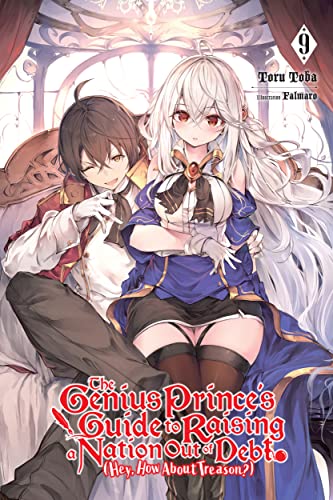By Toru Taba and Falmaro. Released in Japan as “Tensai Ouji no Akaji Kokka Saisei Jutsu ~Sou da, Baikoku Shiyou~” by GA Bunko. Released in North America by Yen On. Translated by Jessica Lange.
As we’ve now gone through about nine volumes of this series, it’s good to remember that the initial premise was that Wein was trying various ways to abdicate his responsibilities, and failing for the most part because a) he’s too good at his job, and b) he won’t do it if it means the people of Natra suffer. For the last few books, that’s mostly been forgotten, to the point where the title almost seems archaic. But this book reminds us that yes, Wein really does not want to be running his country, and he is still trying to take steps to avoid being the ruler. Fortunately for Wein, he has an adorable little sister with even more charisma than he has who sucks up knowledge like a sponge. The most interesting scenes in the book are when he asks Falanya is he really is “good” to the Flahm, and if so, how? Getting her to stop hero-worshipping him is a good first step.
Wein and Ninym are on their way to Ulbeth, a nation divided into four regions: Muldu, Altie, Roynock, and Facrita. In theory they all are distinct areas with their own distinct rulers but united as an alliance. In practice, they all hate each other. Wein has been invited by Muldu’s representative, Agata, a Holy Elite who wants Wein’s help to undermine the other nations. Of course, Wein is not about to do this out of the goodness of its heart, but (as with most books in the series) complications suddenly turn up. Who’s going to win this mini-throne war? Can everything be solved by simply marrying as many couples as possible? And, most importantly, if something happens to Ninym, has Wein matured enough as a person not to simply kill every single person in the nation?
Slavery, as a concept, is so prevalent in light novels that it has become one of the worst cliches, and Genius Prince has been no exception. The Flahm have been presented in the story to date as an oppressed and hated group, and even in Natra, which supports them to an extent, Wein and Ninym have to merely be content to be ruler and aide and nothing more. The backstory of the Flahm has been teased in previous books, but here we get (secondhand) most of the story. I’ll be honest, it’s handled a bit better than other stories of its ilk, but still makes me a bit uncomfortable. On the up side, spoiling the previous paragraph a bit, we’re now seeing Wein be big enough to have someone kidnap Ninym and NOT destroy them completely. Alas, poor Ninym for once is the damsel in distress – her pulling a Wein and bewailing it at the end is hilarious.
I have a sneaking suspicion this series will end with Falanya on the throne and Wein and Ninym running off somewhere together, but we’re not there yet. Till then, this is a solid volume.
